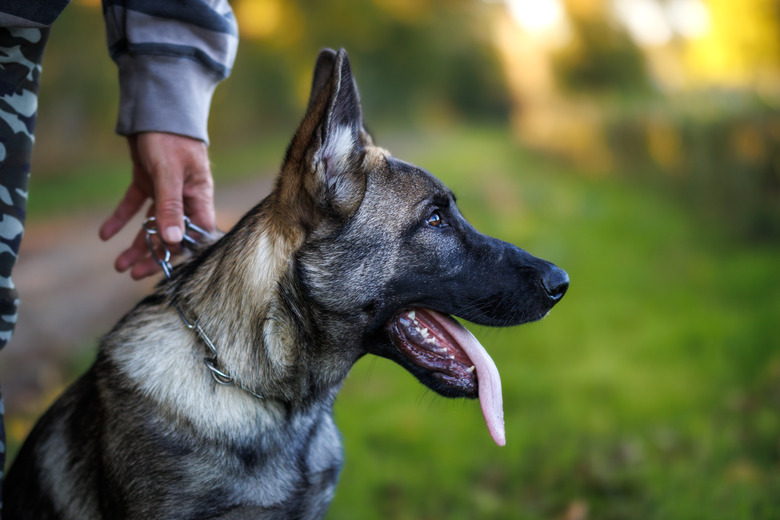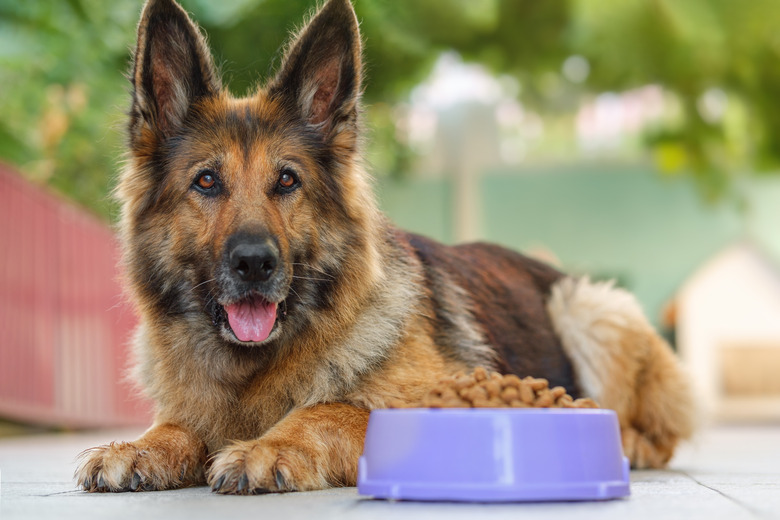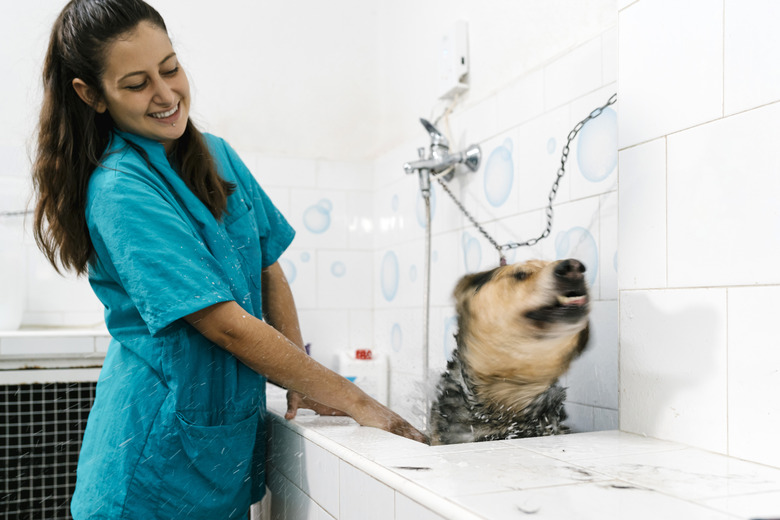How To Treat A German Shepherd With Dry Itchy Skin
German shepherd dogs, affectionately known as German shedders, are famous for their prolific shedding. They also commonly battle bouts of dry, itchy skin. Shepherds have a double coat. The outer coat is rather coarse, straight hair, and the undercoat is soft and fluffy. This tends to keep the dog's coat dry, contributing to itchy or flaky skin.
Do German shepherds have skin issues?
Do German shepherds have skin issues?
Yes, German shepherds are prone to a variety of skin conditions. More than many other dog breeds, GSDs tend to have sensitive skin. They frequently suffer from dry skin, dandruff, and hair loss, often as a result of environmental allergies, food allergies, mites, hypothyroidism, or immune-mediated diseases that impact the skin and coat.
What causes dry skin in German shepherd dogs?
What causes dry skin in German shepherd dogs?
There are a number of conditions that can cause dry, flaky, or itchy skin in dogs. These include:
- Atopic dermatitis: Canine atopic dermatitis is a chronic, inflammatory condition similar to eczema in humans. It is triggered by things like seasonal pollen, human dander, soil fungi, and even certain shampoos. There is a hereditary component to canine atopic dermatitis.
- Flea allergy dermatitis: This is a severe allergic reaction to a flea bite, which can cause intense itching and can lead to secondary skin infections.
- Yeast infections: Yeasts are fungi that typically live on a dog's body without causing harm. However, when there is an overabundance of yeast, a yeast infection occurs, which is extremely uncomfortable for the dog, as it causes intense itching.
- Hot spots (pyotraumatic dermatitis): Canine hot spots are red, inflamed skin lesions that can appear quickly and become infected just as quickly. Veterinarians also call hot spots "superficial pyoderma."
- Pyoderma: This bacterial infection is characterized by raised, red, pimple-like pustules on the skin; circular crusts; dry or flaky patches of skin; hair loss; and itching. As noted above, hot spots are less serious and more common than deep pyoderma (which is more serious). German shepherds are prone to getting both types of pyoderma.
- Mange: A parasitic skin disease caused by microscopic mites, mange comes in two types. Demodectic mange is caused by a parasitic mite, Demodex canis or Demodex injal, that lives in the hair follicles of dogs. The highly contagious sarcoptic mange, also called scabies, is caused by Sarcoptes scabiei mites.
- Food allergies: When dogs develop food allergies or intolerances, it may show up in red, flaky, or itchy skin.
- Autoimmune diseases: German shepherds are more prone to certain immune system diseases, which impact the skin.
- Hypothyroidism: Hypothyroidism in dogs is a hormone imbalance frequently caused by inflammation or shrinkage of the thyroid gland. Symptoms may include hair loss; flaky skin; or a dull, thin coat.
German shepherds and skin allergies
German shepherds seem especially prone to certain skin allergies. Although these can develop at any age, the allergic reactions most likely to trigger German shepherd skin issues generally appear between the ages of 1 and 3. Getting on top of any skin allergies quickly is essential to ensuring your dog's continued good health.
How to treat a German shepherd with itchy skin
Step 1: Bathing to address skin issues
Every dog is different, so if your German shepherd has skin issues, it's a good idea to speak with your veterinarian about how often you should bathe them. In a healthy German shepherd, a bath may only be needed once every six months since bathing can strip the dog's skin of its natural oils and dry it out. However, dogs with allergies or other skin conditions may need more frequent baths.
The type of dog shampoo also matters. A hypoallergenic or medicated shampoo may be needed. Your veterinarian will likely send you home with products that are specifically designed for your dog's specific skin problems.
Step 2: Adjusting the dog's diet
Speak with your veterinarian about changing your dog's diet. In some cases, skin issues can be caused or exacerbated by food allergies. The most common food allergens in dogs are proteins, though other additives can also be problematic for dogs with allergies. Some of the most common food allergens include chicken, beef, eggs, dairy, soy, or wheat gluten. Switching to a rabbit- or kangaroo-based and/or limited-ingredient dog food may help (fish can be an allergen too). Your veterinarian will also be able to recommend a prescription diet designed specifically for dogs with skin issues.
Home cooking can be another option for those whose dogs struggle with food allergies. Dogs, like humans, require a balanced diet to thrive, so dog owners who decide to home cook for their dog should consult a board-certified veterinary nutritionist to ensure that the dog's meals are nutritionally balanced.
As always, when changing diets, be sure there is nothing in the diet to which your dog may have an adverse or allergic reaction.
Step 3: Supplements to help with a dog's dry coat
Depending on the cause of the dog's skin issues, certain supplements may help with dry, itchy skin. In some cases, adding fish oil or quality omega-3 fatty acid sources, coconut oil, vitamin E, or vitamin C to the dog's diet may help to combat dry skin. However, adding too much fat to a dog's diet can potentially cause serious issues, such as pancreatitis or other gastrointestinal problems.
Additionally, adding vitamins may actually do more harm than good if the dog already has a balanced diet and you are adding higher (and potentially harmful) amounts of additional vitamins. For that reason, it's important to speak with a veterinarian before adding supplements to your dog's diet.
Step 4: Ceramides and avenanthramides for dogs
Ceramides and avenanthramides, used in humans to help with skin conditions such as eczema and psoriasis, may also be effective in treating dogs with skin issues. Ceramides, a critical component of healthy skin not present in diseased skin, are naturally occurring lipid molecules. They help the skin to retain moisture, ward off irritants and allergens, and protect against harmful microorganisms. Avenanthramides, found in many plants but especially prevalent in oats, can restore and moisturize the skin.
Both ceramides and avenanthramides help dogs suffering from topical dermatitis by maintaining the integrity of the dog's skin. This means there is less moisture loss, less inflammation, and less itchiness. As a result, the dog is less prone to secondary skin infections and hot spots. These products come in a variety of forms, including sprays, lotions, mousses, and spot-ons.
These four steps should help to address your dog's itchy skin problem. If your dog's skin is so dry that the dog is constantly licking and biting at it, a trip to the veterinarian is needed.
How to prevent your German shepherd's skin from becoming too dry
How to prevent your German shepherd's skin from becoming too dry
They say an ounce of prevention is worth a pound of cure, so if you're looking to prevent skin issues before they start, consider the following for your German shepherd:
- Feed them a balanced, high-quality diet.
- Use a veterinarian-approved shampoo.
- Use a humidifier during cold and dry weather.
- Consider a dog skin moisturizer.
- If your dog starts licking or biting at their skin, take them to the veterinarian immediately before hot spots or secondary infections can occur.
The bottom line
The bottom line
German shepherds are prone to dry skin and various skin issues, including environmental and food allergies, yeast infections, hot spots, and immune-mediated diseases that impact the skin. Skin issues should be diagnosed by a veterinarian who can advise about dietary changes, medicated shampoos, supplements, ceramides, and avenanthramides that can help to get rid of the itching and clear up the dog's skin.


